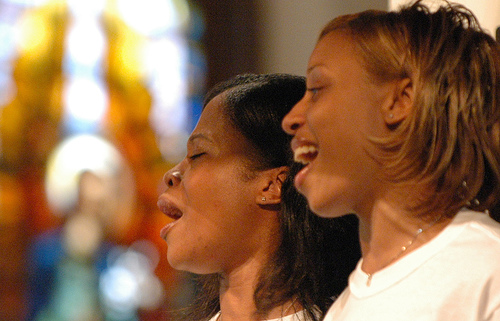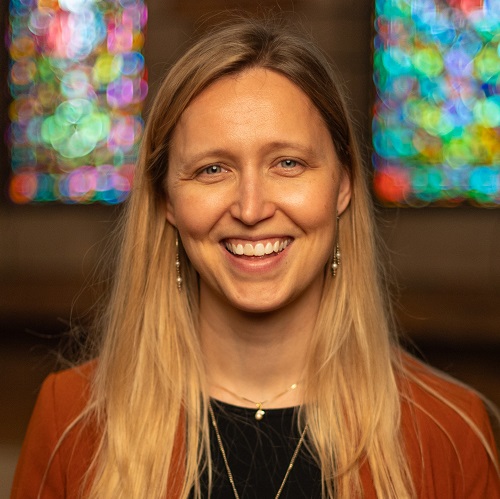To sing, or not to sing? At this time of year, that’s always the preacher’s (and worship planner’s) question.
You all know the argument: when does the church’s Christmas season start? December 25. When does society’s Christmas season start? Black Friday. And when do we start seeing Christmas carols and commercials and decorations pop up? October 31. It’s a fact that makes many a preacher grind their liturgical teeth. And then of course, there’s always at least one comment made, at some point during Advent, either directly to the preacher or just in their hearing range: “I really wish we’d sing more Christmas songs in church during December.”
You all know the argument. And you all have probably picked sides. There are those who bravely (or stubbornly) fight the good fight, defy the world’s pressures, and choose only Advent songs during the season of Advent. Advent’s about waiting, right? So, we’ll wait to sing the Christmas songs.
Then there are those who stubbornly (or bravely) point out the wonderful theology of Christmas hymns, the true and eager desire of the people in the pews to experience those powerful musical expressions of faith as the rest of the world throws at them songs like “Grandma Got Run Over by a Reindeer.” The Christmas season is short, they say. Sing ‘em now, before people are sick of the whole thing.
Know what? They’re both right.
Part of this all comes back to the true meaning of the season — and no, I don’t actually mean Christmas. I mean Advent. Advent is about waiting for God to come to us. It’s a deep expression of a reality that goes farther back in our faith even than Christ himself, back to the time of the Israelite’s religious, political, and geographical oppression. “How long, O Lord?” they cry in the Psalms. “When will you send us a Savior?” And oh man, do we all know that kind of waiting in our lives: waiting for a prayer to be answered for a loved one in pain. Waiting between a death and a funeral for that final commendation to God. Just waiting for someone to call so we don’t have to feel lonely anymore.
Advent hymns are often more minor in tune than Christmas hymns because Advent wants to give homage to this kind of waiting. And if you listen to too many Christmas carols or eat too many cookies, you can easily ignore others who are in this kind of waiting or even numb that kind of waiting out of ourselves.
The wait for the Messiah is deep in our collective faith memory, and it’s a deep expression of faithful longing. This is a hopeful waiting.
But … that’s not the only kind of waiting there is. There’s also the excited waiting. The breathless, thoughtless, eager kind of waiting that’s best described by memories we all share: the waiting a young child does for a birthday party; the waiting a parent does for the college student to arrive home at Thanksgiving (probably with only very sparse communication for months); the kind of waiting that says you just can’t wait for this happy day to happen! (If you want more on this, read David Lose’s article on this kind of waiting.)
This, I believe, is one of the reasons people love to listen to Christmas music before the actual day of Christmas: it’s how they express the joy and excitement of waiting for the upcoming blessed event to get here.
This, too, is a hopeful waiting.
In the Advent vs. Christmas (music and more) debate, when we choose only one kind of music over the other, what often happens is that one type of waiting gets chosen over the other: the waiting that expresses longing and patience at the salvation to come, or the just-as-valid waiting that expresses excitement and impatience at the joy to come.
But here’s the thing: there are people in the pews that are living in both types of waiting — often at the same time. To give preference to one experience of waiting over the other is to give preference to one experience of life in this season over another.
I’ve heard it said that the church is the one place where the longing kind of waiting gets a voice; everywhere else is already celebrating. And yes, that’s probably true. But maybe the church could be a place that models homage to both kinds of waiting.
This could be done in lots of ways: put Advent words to Christmas tunes. Start the season only allowing one Christmas hymn, but build momentum by adding more as you move closer to Christmas. Preach a joint spoken and sung sermon, using different hymns of Advent and Christmas to highlight the different kinds of waiting.
Or, if the thought of Christmas hymns on a Sunday morning is unbearable, allow a special service or two dedicated just to Christmas carols — your own little Christmas speakeasies so to, um, speak. (If you’d like more ideas on using Christmas Carols in worship, check out Marc Kolden’s article here.)
Whatever you decide to do this holiday season, remember the reason for the Advent season — and give space and voice to all kinds of waiting that people are doing. Christ is coming! Halleluiah! But of course, Christ is not here yet…

